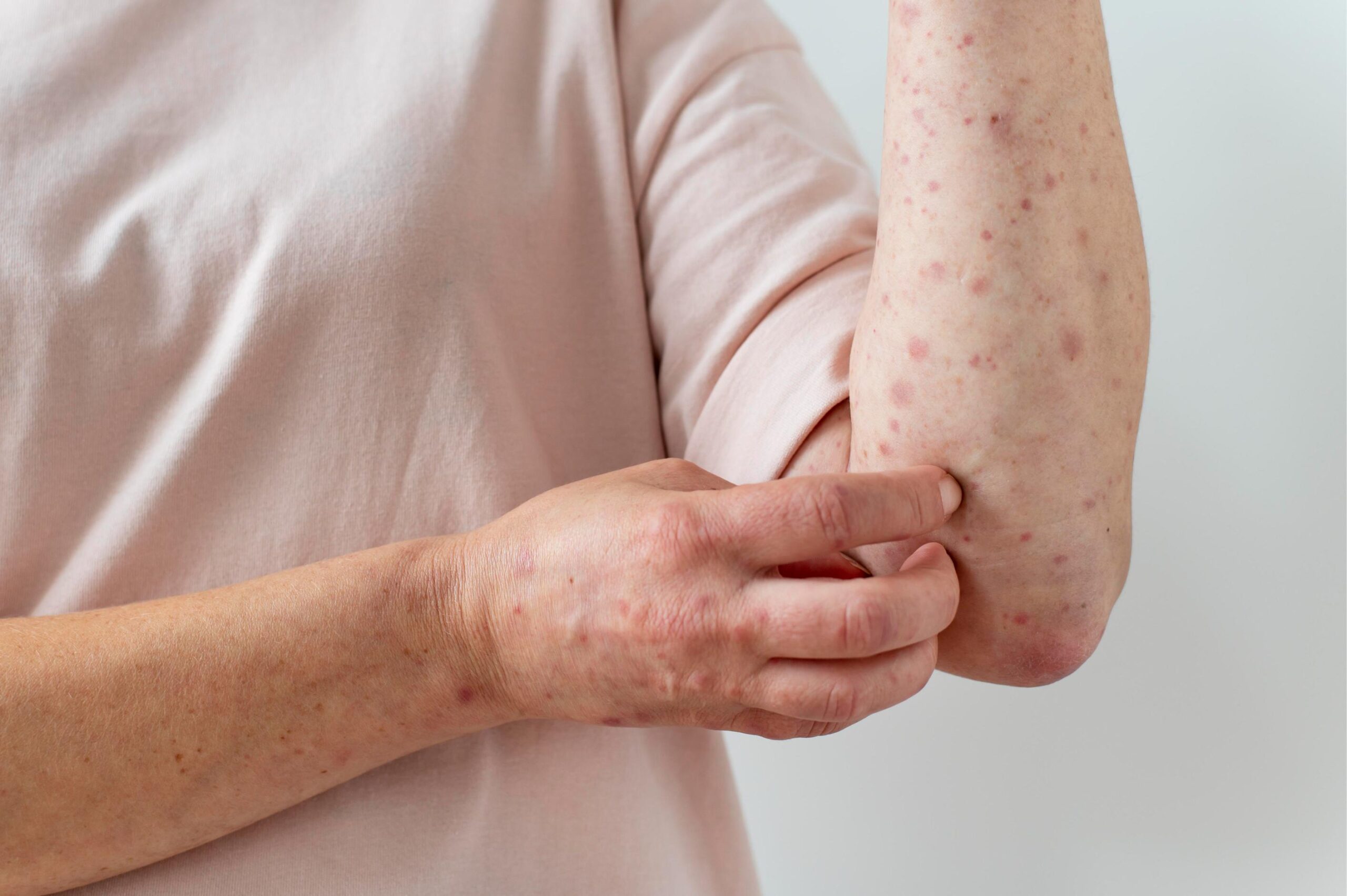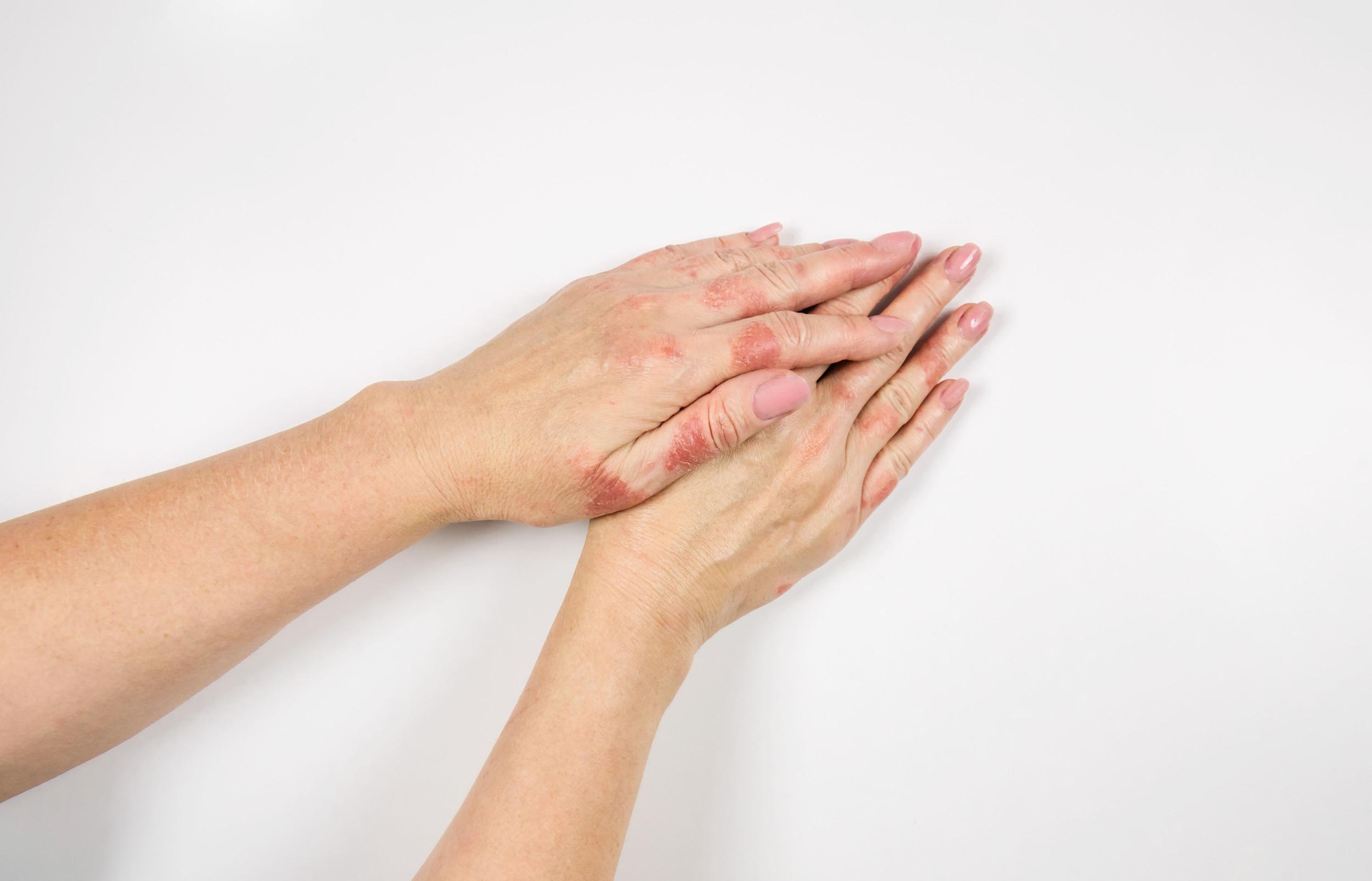

Millions of people worldwide suffer from eczema, a chronic skin illness that negatively impacts the comfort and confidence of those who are affected. Modern medicine frequently offers restricted remedies in its pursuit for relief. On the other hand, the age-old knowledge of Ayurveda provides comprehensive insights into comprehending and treating eczema. Come along with us as we take a trip through time and customs as we examine the Ayurvedic definition of eczema, reveal its background, and learn about the medicinal herbs that can bring healing and hope.
-
What is Eczema in Ayurveda?
In the holistic realm of Ayurveda, eczema is known as “Vicharchika,” a term encompassing various inflammatory skin conditions characterized by itching, redness, and dryness. Ayurvedic philosophy attributes eczema to imbalances in the body’s doshas—particularly aggravated Vata and Pitta doshas—resulting from poor digestion, stress, and immune dysfunction. Ayurveda emphasizes restoring balance and harmony to the body’s energies to alleviate eczema symptoms and promote skin health.
-
History of Eczema:
The history of eczema can be traced back through the annals of time, with references to inflammatory skin conditions found in ancient medical texts from India, Egypt, and Greece. In ancient India, texts like Charaka Samhita and Sushruta Samhita describe symptoms and treatments for skin diseases, advocating for herbal remedies, dietary modifications, and lifestyle interventions. It wasn’t until the 19th century that modern medicine began to recognize eczema as a distinct clinical entity, prompting scientific research and medical interventions to address its prevalence and impact.
-
Some Important Facts about Eczema:
- Dosha Imbalance: Ayurveda attributes eczema to imbalances in the body’s doshas, particularly aggravated Vata and Pitta doshas, which lead to dryness, inflammation, and itching of the skin.
- Role of Agni: Ayurveda emphasizes the importance of balanced digestive fire or “Agni” in eczema, as poor digestion can lead to the accumulation of toxins that affect the skin and immune system.
- Lifestyle Factors: Ayurveda recognizes the impact of dietary habits, stress, and environmental factors on eczema, advocating for mindful eating, stress management, and regular detoxification to promote skin health.
-
Research for Eczema Based on Ayurveda:
- 1500 BCE: Ancient Ayurvedic texts like Charaka Samhita and Sushruta Samhita document symptoms, causes, and treatments for skin diseases, providing valuable insights into ancient perspectives on dermatological health.
- 1700s: Ayurvedic physicians develop specialized treatments for inflammatory skin conditions, including eczema, utilizing herbs such as Neem (Azadirachta Indica), Turmeric (Curcuma Longa), and Aloe Vera (Aloe Barbadensis).
- 2005: Clinical studies published in the Journal of Ethnopharmacology demonstrate the efficacy of Ayurvedic herbs such as Neem, Turmeric, and Manjistha (Rubia Cordifolia) in reducing inflammation, relieving itching, and promoting skin healing in patients with eczema.
- 2013: Research conducted at Ayurvedic research institutes in India explores the potential of traditional Ayurvedic therapies, including Panchakarma (detoxification) and herbal supplements, in managing eczema and improving skin health.
-
Ayurvedic Herbs for Eczema:
- Neem (Azadirachta Indica): Neem is revered in Ayurveda for its antibacterial, antifungal, and anti-inflammatory properties, making it a potent remedy for eczema. It helps reduce inflammation, soothe itching, and promote skin healing.
- Turmeric (Curcuma Longa): Turmeric contains curcumin, a powerful antioxidant and anti-inflammatory compound that helps alleviate symptoms of eczema, such as redness, swelling, and itching.
- Manjistha (Rubia Cordifolia): Manjistha is a blood-purifying herb that helps detoxify the body, reduce inflammation, and promote skin healing in eczema.
- Aloe Vera (Aloe Barbadensis): Aloe Vera is known for its soothing and moisturizing properties, making it beneficial for relieving dryness and irritation associated with eczema.
-
Stories from Ancient Scriptures:
Legend has it that the sage Charaka possessed profound insight into the treatment of skin diseases. Through his deep understanding of herbs, diet, and lifestyle, Charaka healed countless individuals afflicted with eczema, restoring balance and vitality to their skin and body.
“The greatest wealth is health.” – Virgil
“Healthy skin is a reflection of overall wellness.” – Dr. Howard Murad
-
Conclusion:
The study of Ayurveda provides direction and illumination on the path to skin health and vitality, as well as holistic healing and overall wellbeing. Through adherence to the age-old values of harmony, balance, and mindful life, we can boldly and clearly navigate the difficult maze of eczema. Join us as we go on a quest to restore robust health and flawless skin by embracing the treasures of Ayurvedic medicines and therapies.






